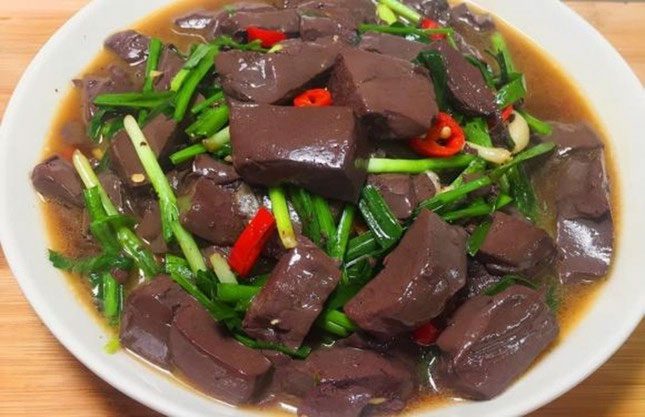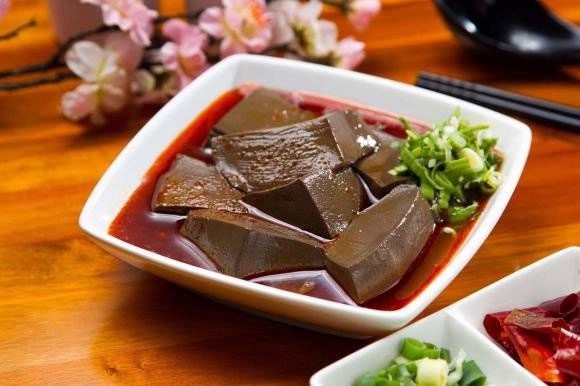Pork blood is a nutritious dish, but for certain individuals, it can turn into “poison,” severely impacting health and potentially worsening medical conditions.
Benefits of Pork Blood
While consuming animal organs, especially those from pigs, is not generally recommended due to the risk of potentially dangerous diseases like streptococcal infections, the benefits of pork blood cannot be denied.
Composition of Pork Blood
Pork blood is rich in nutrition, with an average protein content of about 74%, which is four times that of pork, five times that of chicken eggs, and includes all eight essential amino acids necessary for the human body.
Every 100g of pork blood contains up to 16g of protein, surpassing both beef and pork. The protein in pork blood has a composition of amino acids similar to those in human bodies, making it easily absorbed and digested. Pork blood also contains lecithin, iron, and other essential trace elements. Therefore, consuming pork blood is very beneficial for health!
6 Main Benefits of Pork Blood
Supports Weight Loss
For those on a weight loss journey, pork blood is an excellent supportive food due to its high iron content, which can help prevent anemia while dieting, all at a low cost.
Benefits: Aids in blood clotting, is beneficial for the colon; in Traditional Chinese Medicine, consuming pork blood can treat anemia.

Rich in nutrition, the average protein content in pork blood is approximately 74%, equivalent to four times that of pork, five times that of chicken eggs, and includes all essential amino acids for the human body. (Image source: Internet).
Disease Prevention
Pork blood contains a high level of iron that is easily absorbed by the body. Consuming animal blood is beneficial for the growth and development stages of young children and pregnant or breastfeeding women, helping to prevent iron deficiency anemia, as well as cardiovascular diseases, arteriosclerosis, and thrombosis in the elderly.
Anti-Cancer Effects
Experimental medicine has shown that trace elements in pork blood can prevent the development of malignant tumors. Scientists have identified a substance called wound hormone that can damage or destroy cells in need of removal, while also facilitating the repair of damaged tissues, helping them gradually regain normal function. This is something that other foods find difficult to achieve.
Anti-Aging
Pork blood is rich in phospholipids, which can increase acetylcholine levels, enhancing the connectivity among nerve cells and thereby improving human memory. Therefore, elderly individuals and those suffering from dementia should consume more pork blood.
Helps with Blood Clotting
Pork blood contains vitamin K, which promotes blood clotting, making it effective for this purpose.
It can also enhance the levels of trace elements in the body, aiding in better treatment and nutrition for patients suffering from malnutrition, kidney, and cardiovascular diseases. Additionally, it is used to treat dizziness, vomiting, bleeding, bruises, and blood loss leading to seizures…
Cleanses Metal Particles
Moreover, pork blood is effective in cleansing harmful metal particles from the body. Modern medicine has researched and found that the protein in pork blood, after undergoing digestion in stomach acid, produces a substance that can disinfect the intestines. This substance can enter the human body and destroy the biochemical reactions of harmful metal particles, which are then eliminated through excretion. Thus, regular consumption of pork blood helps expel harmful substances from the body.

Pork blood has a high cholesterol content. Therefore, individuals with cardiovascular disease or high blood cholesterol should avoid this dish. Those undergoing treatment for blood clotting disorders should also refrain from consuming pork blood. (Image source: Internet).
3 Groups Who Should Avoid Pork Blood
Individuals with Cardiovascular Disease
Pork blood has a high cholesterol content. Therefore, individuals with cardiovascular disease or elevated blood cholesterol should avoid this dish. Those undergoing treatment for blood clotting disorders should also refrain from consuming pork blood.
Individuals with Gastrointestinal Bleeding
Pork blood is rich in iron, which is beneficial for blood production, but excessive consumption can lead to black stools. Meanwhile, individuals with gastrointestinal bleeding also exhibit signs of black stools. This can affect the results of medical examinations and treatments.
Individuals with Liver Cirrhosis
While healthy individuals benefit from the blood-nourishing and liver-replenishing effects of pork blood, those with liver cirrhosis may experience excess protein intake, causing more severe liver damage.
Precautions When Consuming Pork Blood
Doctors also advise against consuming large amounts of pork blood at once, as the human body struggles to absorb high levels of iron in a short period.
Excessive iron intake can even lead to poisoning. Symptoms may include vomiting, stomach pain, and other harmful health reactions.
Experts recommend consuming pork blood only once a week or 2-3 times a month. Additionally, it’s important to focus on incorporating a variety of other nutrients into your diet.
Furthermore, not everyone is suitable for consuming pork blood. Those experiencing gastrointestinal bleeding should definitely avoid it. Others who should stay away from this dish include individuals with high blood fat, unstable blood pressure, or high cholesterol levels.
When purchasing and preparing dishes with pork blood, home cooks should ensure that the food is fresh, ideally sourced on the same day, and should not buy if the blood has unusual colors or odors.
Any signs of spoilage can lead to diarrhea, vomiting, and other digestive disorders.
Additionally, doctors advise against consuming blood pudding due to the high risk of contracting diseases, including pig streptococcus infections.
If a pig is sick and dies, even if cooked, pork blood should not be consumed.
If symptoms such as diarrhea, high fever, or skin bleeding occur after consuming pork blood, patients should seek immediate medical attention.



















































